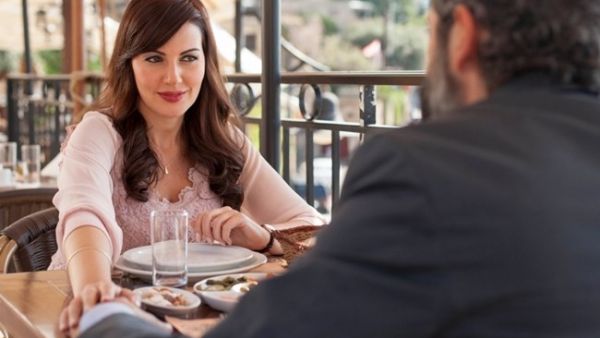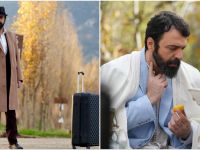There’s no shortage of trash-talk about Islam nowadays. Between Daesh (nee ISIS) and sundry loons around the world seeking to justify murder with religion, it’s seldom been easier to dehumanize Muslims. It’s an interesting time, too, to unveil “Halal Love.”
The new movie by Lebanese filmmaker and academic Assad Fouladkar had its world premiere at the Dubai International Film Festival a couple of weeks back, screening in the Arabian Nights program. Next month the film will have its North American debut at the Sundance film festival, America’s pre-eminent independent cinema platform.
“Halal Love” follows three Lebanese couples, devout Muslims working through relationship difficulties that they want to address as Muslims. Their problems run the gamut from the comic to the mundane. The relationship of Awatef and Salim (Mirna Moukarzel and Ali Sammoury), a middle-aged couple with two young daughters, is naturally comic. The years have done nothing to dampen Salim’s enthusiasm for sex with his wife, but Awatef – exhausted by the demands of running the household – has little interest in sating Salim’s energetic libido.
A second wife, she suggests, would provide an outlet for his urges and give her a chance to get some much-needed sleep. Salim is uninterested, but Awatef goes ahead and finds him another wife anyway.
She finds a compliant candidate in Mahroussa (Fadia Abi Chahine). Her father – who nicknamed his eldest daughter “Bardot” because he decided she resembled the French sex symbol – had forbidden her to marry because he couldn’t bear her leaving his side.
Subservient in all things and enthusiastic about submitting to Awatef’s every whim, Bardot seems a perfectly compliant junior partner in her and Salim’s marriage.
The problems of Loubna (Darine Hamze) are of a more dramatic order. She’s just divorced her first husband and hopes to reignite her youthful relationship with Abdullah (Rodrigue Sleiman).
Loubna’s parents sent Abdullah packing because he was below her station but he’s keen to relive their old romance as well. Now a greengrocer, Abdullah’s married as well and goes by the honorific Abou Ahmad.
The long-awaited follow-up to “When Maryam Spoke Out,” Fouladkar’s award-winning 2001 debut, “Halal Love” speaks a dialect of popular cinema that’s more interested in audiences than critics.
Juggling filmmaking with a teaching career at Beirut’s Lebanese American University, Fouladkar has for the past few years divided his time between Beirut and Cairo, where he directs the television sit-com “Ragel wa Sitt Sittat.”
The filmmaker sat down with The Daily Star on the sidelines of DIFF to discuss the arduous process of getting this film made.
One thing about “Halal Love” that will strike many viewers is the absence of the region’s main geo-political divide nowadays, between Sunni and Shiite Islam.
“In the beginning [the film] was more focused on one group in Islam,” Fouladkar said. “Then I felt, ‘No, it shouldn’t be about just one group.’ Maybe we shouldn’t specify. Let’s just keep it open ...
“I felt that people would react wrongly to the film [as I first imagined it] so [I decided to] keep it about [all] Muslims.”
Muslims have been known to disagree about Islam, and some may find some of the characters’ behavior to be imperfectly Islamic. One couple has a temporary marriage – a period of sanctioned physical intimacy with a start date and an end date that some will read this as “zawaj mutaa,” a practice associated with Shiite Islam.
“It’s not really important if it’s mutaa,” Fouladkar said, “because in Sunni they have other types of marriage, like ‘misyar,’ that are almost the same.
“The original script was set in Dahiyeh [Beirut’s largely Shiite southern suburbs],” he continued. “Why Dahiyeh? Because this is where I come from. I was writing about what I know.
“Then came this funny stuff. Audiences would laugh at the characters in the film. Then I thought, ‘No it’s about everyone, so let’s just keep it this way.’ It’s much better for the film as a film if the characters are simply Muslims ...
“It’s not the aim of the movie [to focus on one group of Muslims].
“Its aim is to talk about people having those problems, and these apply everywhere.”
Fouladkar says several stories in the screenplay’s original drafts didn’t make the final cut for various reasons.
“The film used to have six stories,” he recalled. “In the editing process I felt, along with some American editors, that I should focus more on some stories and forget the others.
“Instead of having quick stories let’s just focus on some of the stories and see what happens to them ... I cut some lovely stories. This is why I’m doing other films based on those stories.
“Now I’m much happier with this script. If I still had those six stories people would have reacted differently. It might not be as popular, maybe.
“The original film was more explicit, talking-wise. It had no sex, definitely, but [the characters’ language] was so explicit I had to cut some things out, because of [how people might react].
“I’d love it to be more explicit ... I wanted to look behind the curtain of conservative places [where you] meet women speaking very explicitly about everything. You’d be shocked to hear them talking this way. They will definitely not talk to men about such things.”
The film makes a winking gesture to what cannot be said when Awatef is negotiating for Bardot’s hand. Her salty language makes Bardot’s mum frown and point out that certain subjects are a “no-no.”
“In my film [the characters include] highly respectable veiled women. How can they say ‘dicks?’ How can they say ‘fuck?’ The Arabic popular terminology can be quite shocking.
“Now it’s more of a family film. That’s fine. This is how you start somewhere and you end up somewhere else, because you are faced with reality.
“There are some things that can be said and more things that we cannot talk about, especially when I’m tackling very sensitive subjects ...
“Censorship in Lebanon is not just about authority. In the Arab world, anyone on the street will censor you. In the age of Daesh, everyone can decide your fate if they feel like it. So I played it safe.”
The film also seems to be interested in making a distinction between Islamic law and local social and cultural practices.
The story of Batoul and Mukhtar (Zeinab Hind Khadra and Hussein Mokaddem), for instance, is one of a young couple whose steamy love life stems in part from Hussein’s hair-trigger temper.
He’s so jealous of his pretty wife that, as the film opens, he’s already divorced her twice, suspecting that she’s messing around with other men. Mukhtar is reminded that couples are forbidden to remarry after a third divorce – unless the wife consummates a marriage with another man first.
Yet the real problem – Mukhtar’s insecurity and jealousy – has nothing to do with Islam.
“I’m talking about Lebanese Muslims,” Fouladkar said. “They’re not fanatics. They’re believers. Some are veiled, others are not. Batoul looks modern, as does Mukhtar, but they believe in Islam.
“Islam is part of life but when faced with problems, let’s see how they can get away and find a solution. This is where the comedy is, when they accept something that’s so weird just because they want a way out.”
Residents of the Middle East are unlikely to see anything unfamiliar in “Halal Love.” The familiarity provokes questions about the film’s intended audience.
“For the Westerners, every story opens up more questions,” Fouladkar said. “The Muslims will recognize what’s not being said.”








